
World Interfaith Harmony Week (WIHW)
promoting harmony and understanding among people of different faiths and beliefs
World Interfaith Harmony Week (WIHW) is an annual event observed during the first week of February, as designated by the United Nations General Assembly in 2010. It aims to promote harmony and understanding among people of different faiths and beliefs.
The initiative seeks to foster a culture of peace and non-violence, highlighting the common values and principles shared by various religions. It encourages dialogue, cooperation, and mutual respect among people of diverse faiths, promoting harmony and understanding at both the individual and community levels.

Divine Indwelling, together with various Faith communities, celebrates World Interfaith Harmony Week by cultivating curiosity instead of fear.
We weave knowledge, facilitate healing, and promote appreciation for diverse faith traditions.
By breaking down barriers and fostering dialogue, we aim to combat religious ignorance and prejudice, spark joyful curiosity and understanding between and within religious communities, develop deep respect for various faith traditions, heal the wounds of separation, address the psychology of "otherness," and ultimately, rebuild the Beloved Community by sacralizing bonds, ties of kinship, and social solidarity.
An interfaith initiative co-created with:
Join us
2026 World Interfaith Harmony Week
1-7 February 2026, Ubud, Bali
Join us during World Interfaith Harmony Week
What to Expect:
Interfaith Prayer Services: Participate in interfaith prayer services that honor the diversity of spiritual traditions.
Heirloom Sacred Wisdom Teachings: Learn from seasoned spiritual teachers and explore ancient wisdom traditions.
Cross-Cultural Exchange: Connect with people from around the world and share your unique spiritual journey.
Community Rituals: Join in collective rituals and ceremonies that foster unity and harmony.
Lineup, veNues, and schedule - Coming soon
Schedule
Join us during World Interfaith Harmony Week for a unique opportunity to explore diverse faiths.
Each day, a different faith leader will open the doors of their community's place of worship, inviting you to experience firsthand their traditions, rituals, and personal stories.
Immerse yourself in a warm and welcoming atmosphere as you connect with people from all walks of life and discover the shared humanity that unites us all.
-
-
Hosts:Babaji and Punnu Wasu
Venue: Guru Nanak DharamShala Gurudwara, Nyuh Kuning, Ubud, Bali
Schedule:
Welcome Blessing (15 minutes):
Storytelling (1 hour divided into 30 minutes + 30 minutes Q&A):
Some background about Sikhism including:
What does the word Sikh mean?
Who founded Sikhism? Who is Guru Nanak & his divine calling, his travel companion Mardana (to demonstrate the interfaith spirit of Sikhism)? About the 9 gurus who succeeded Guru Nanak?
What is Sikhism (monotheistic, Ik Onkar, Khalsa, etc.)
A personal story shared by a practitioner or master of Sikhism followed by Q&A
SATSANG/Heirloom Sacred Wisdom Sharing (30 minutes):
Sacred Scripture Reading (15 minutes):
A reading of the speaker's favorite scripture from the GURU GRANTH SAHIB.
(SHABAD) KIRTAN Celebration (45 minutes):
A communal musical celebration followed by a losing prayer (Ardas) for Peace in the World
Langar (30-45min) - potluck (participants to bring food to share)
-
Hosts: Mahmoud Tieima, Daria Miloslavskaya and Langston Hues (Muslims in Bali)
Schedule:
17:00 - 17:15 Asr Prayer
17:15 - 17:45 Personal Story "From Islam & from Atheism to Islam"
17:45 - 18:00 Q&A
18:00 - 18:15 Quran Reading
18:15 - 18:45 Wisdom from the Text
18:45 - 19:00 Q & A
19:00 - 19:15 Maghrib Prayer
19:15 - 20:00 Muslim Sufi Zikr
20:00 - 21:00 Social & Dinner
-
-
LOCATION: BALI MEDITATION CENTER, UBUD, BALI
4:30-5pm: Arrival & Welcome
5-5:15pm: Blessing: Pahung Mahaka
5:15-6pm: Storytelling: The life of a Buddhist Monk (in conversation with a Buddhist monk from Wat Phra Dhammakaya in Thailand
6-7pm: Meditation “World Peace Through Inner Peace” (including teaching on Meditation)
7-7:45pm: Mantra singing: Dhammajakkappavattana Sutra
7:45-8pm: Closing meditation & lighting of the Peace Candles
-
-
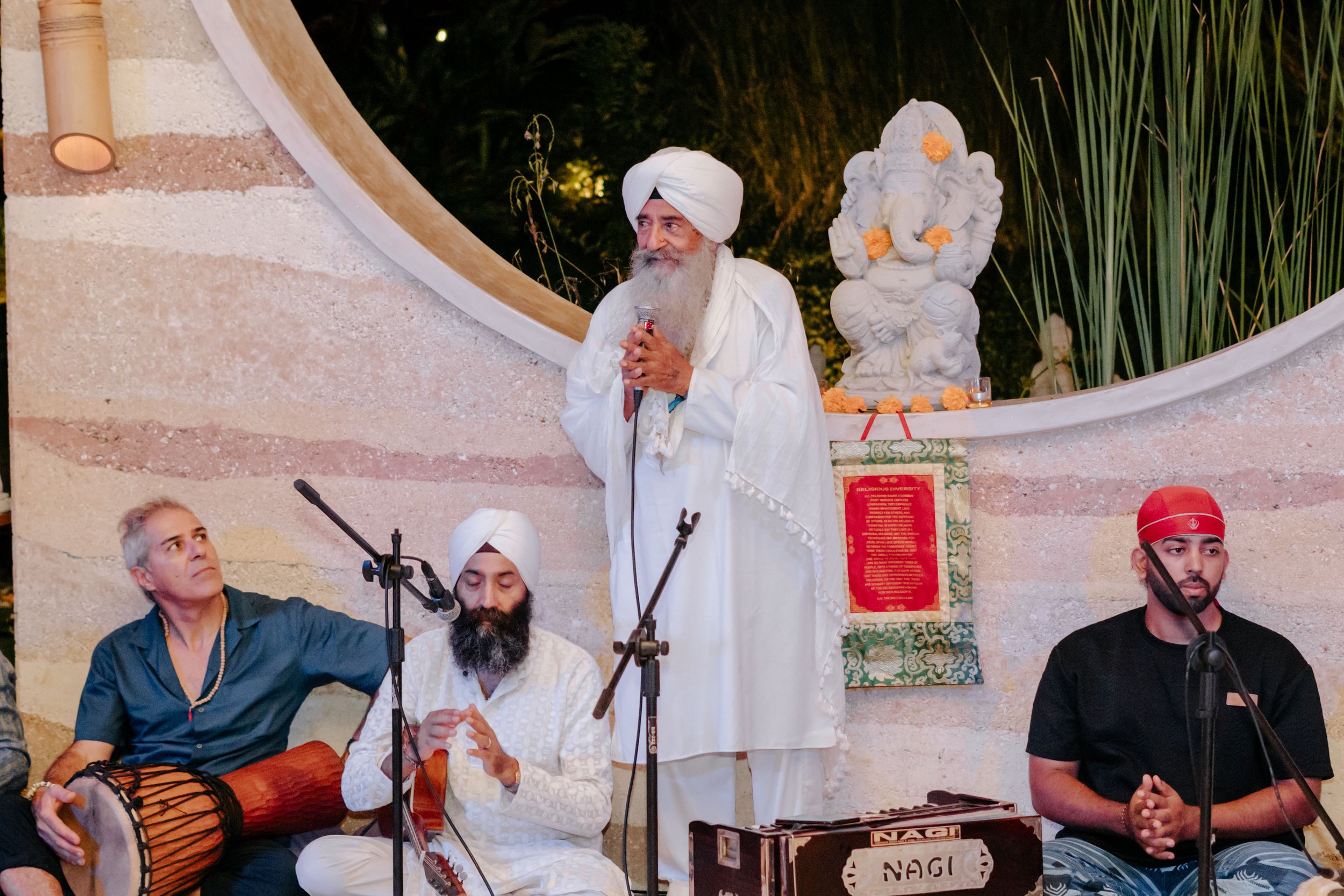

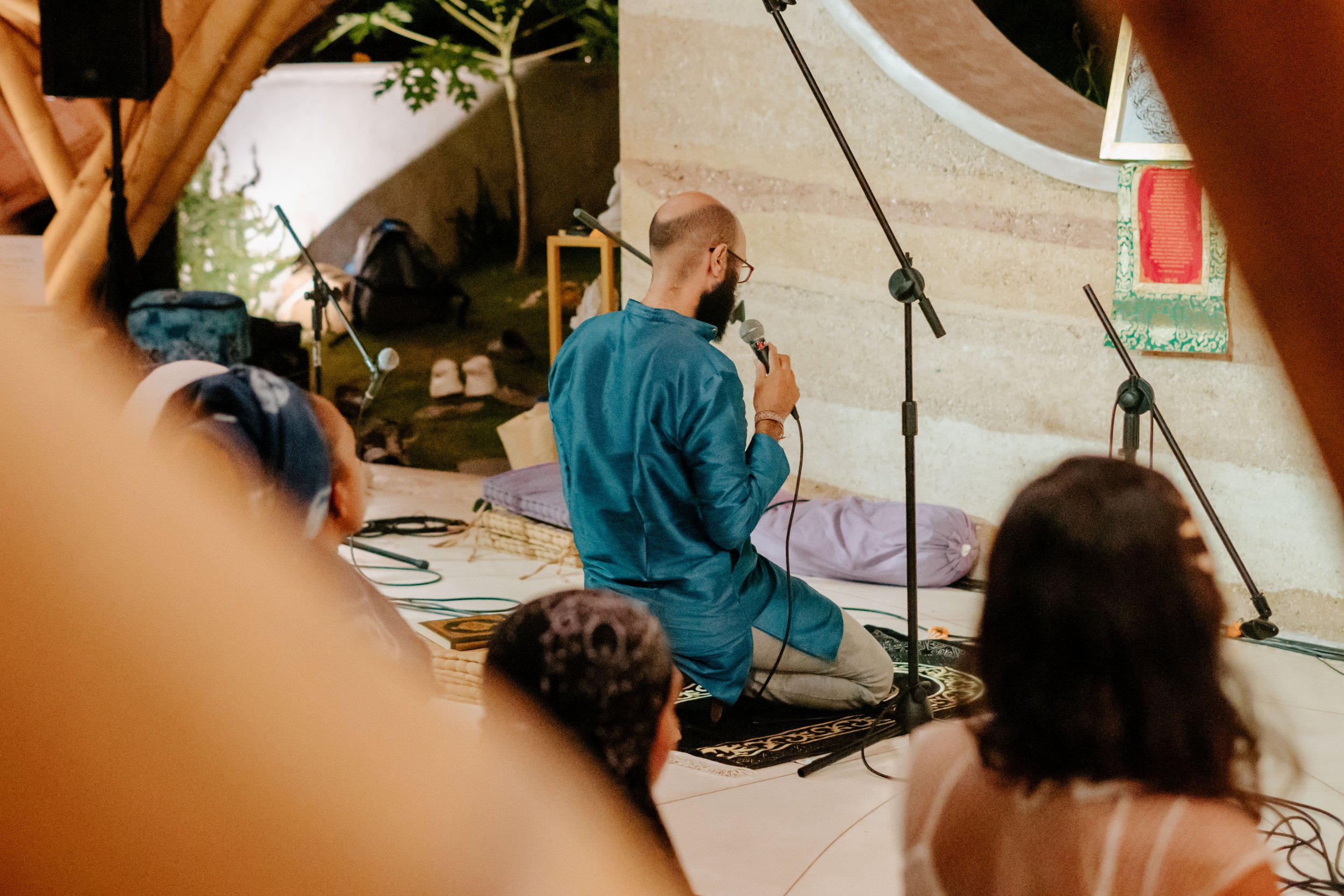
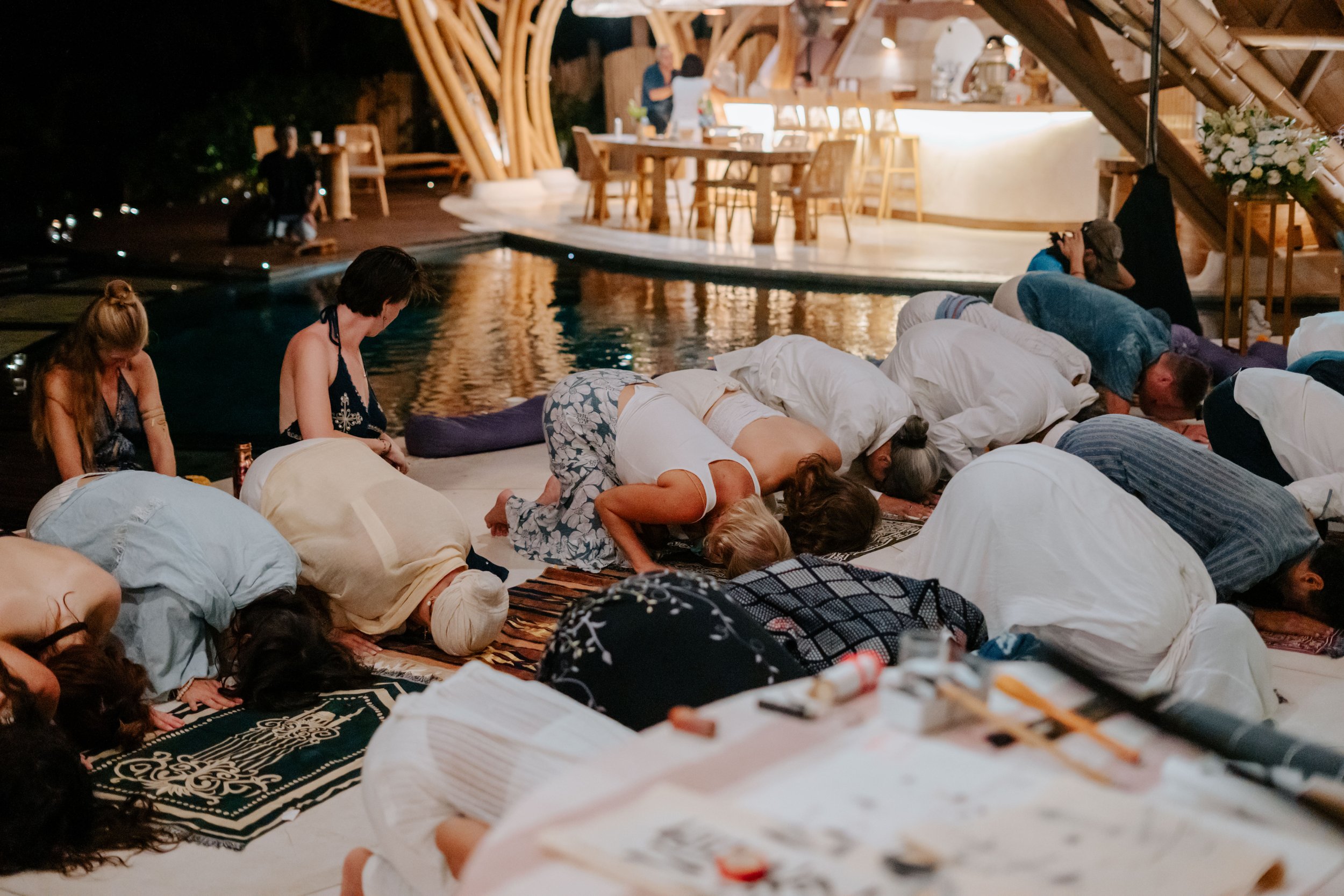
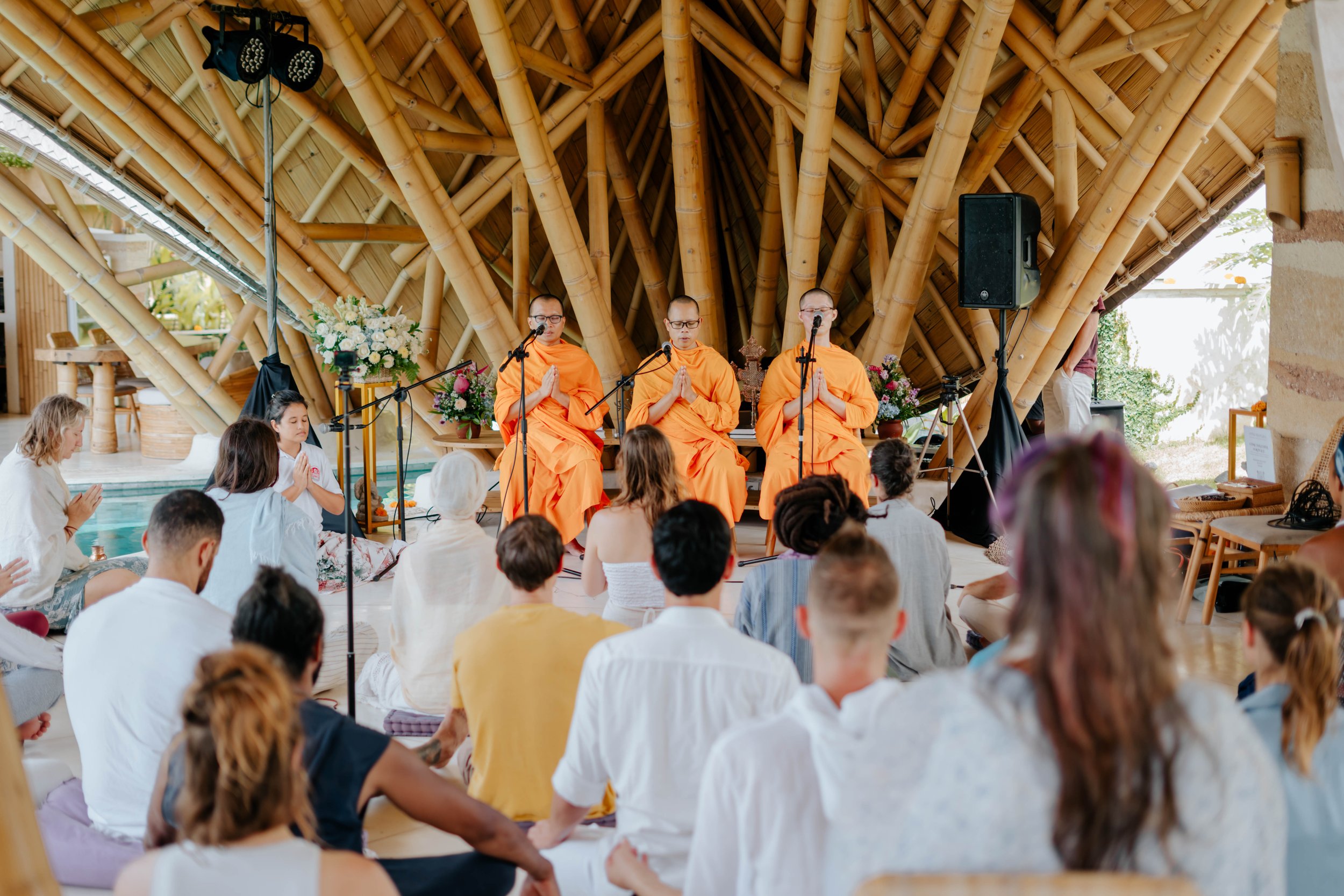


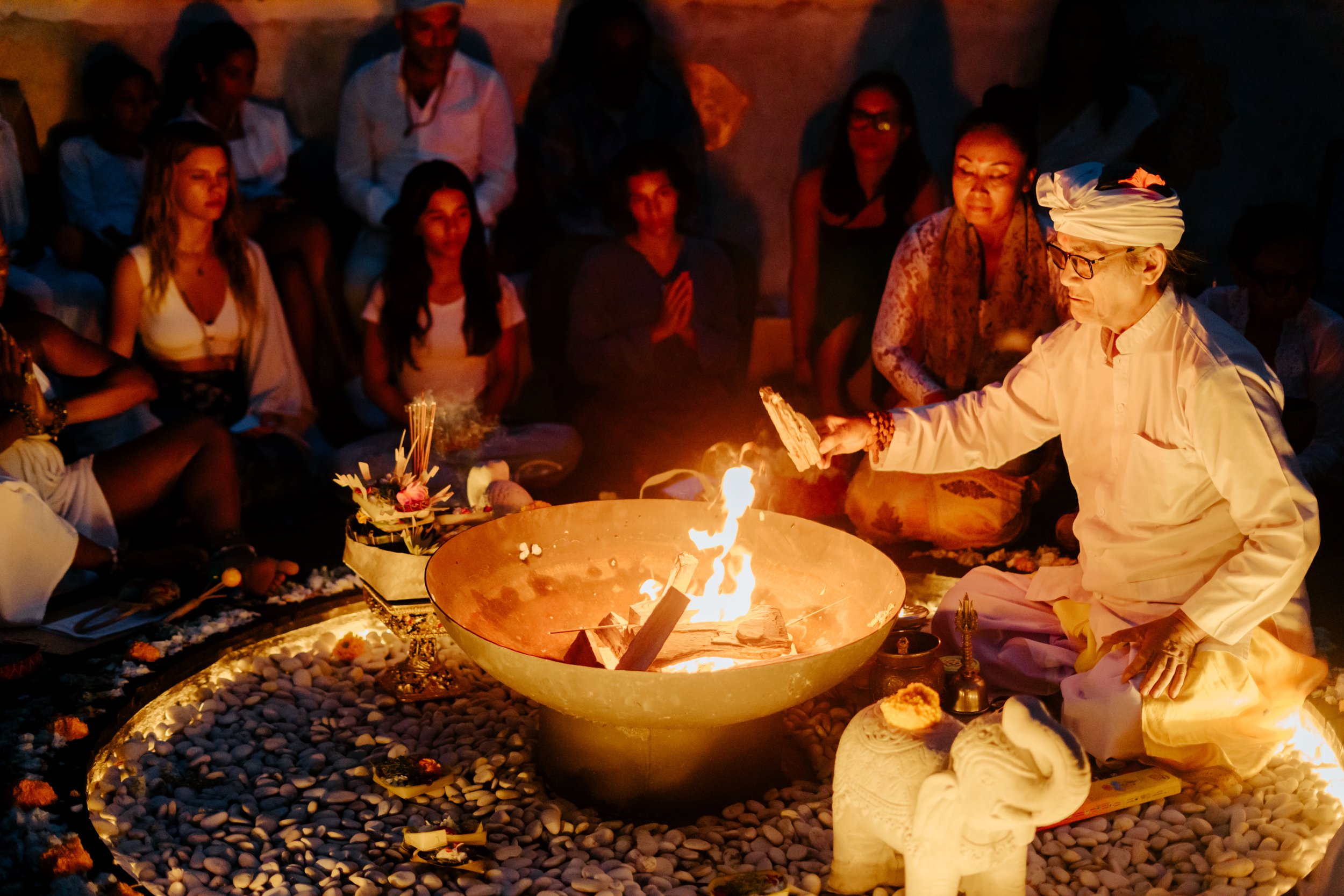
General Program
Time: 5-8pm (Arrival 4:30pm) | Each day's event will be 3 hours and will follow this basic structure:
Ritual (15 minutes):
A brief ritual or ceremony specific to the featured religion. This could be a prayer, meditation, or a symbolic gesture.
Storytelling (1 hour divided into 30 minutes + 30 minutes Q&A):
A personal story shared by a practitioner or master of the featured religion. This story will highlight their personal connection to the faith and a significant figure within that tradition.
A Q&A session will follow to allow for deeper engagement and discussion.
Heirloom Sacred Wisdom Sharing (30 minutes):
A practical spiritual practice or teaching shared by the speaker. This could include meditation, prayer, or a specific ethical principle. The practice should be directly linked to fostering inner peace and promoting peace with others.
Sacred Scripture Reading (15 minutes):
A reading of the speaker's favorite scripture from the featured religion.
Celebration (45 minutes):
A communal celebration through worship, singing, or other forms of spiritual expression. This could involve traditional music, chants, or prayers.
The featured religions will be HINDUISM, BUDDHISM, CHRISTIANITY, ISLAM, AND SIKHISM.

Why is Interfaith Harmony important?
Religiously motivated conflicts are still prevalent and horrific, as well as the persistence of other forms of religious intolerance and discrimination.
This year has been another year of unspeakable religious violence: Palestine/Israel war, Yemeni Civil War
As well as:
Continued violence by religious extremist groups: ISIS (Syria, Iraq, Africa, South Asia), Boko Haram (Nigeria & adjacent countries)
Increased recruitment of youth into such groups
Increased religious intolerance: islamophobia, antisemitism
Persecution of religious communities: Uyghurs in China, Christians in some Muslim-majority countries, etc.
Religious violence is not inherent to any specific religion or faith
Regional TrendsMiddle East: protracted armed conflicts with religious dimensions, often entangled with political and territorial disputes.
Africa: violent extremism fueled by complex factors like poverty, political instability, and ethnic tensions intertwined with religious ideology.
Asia: Religious tensions and discrimination against minority groups.
Europe and North America: religious intolerance with the rise of right-wing parties (hate speech, societal marginalization, and restrictions on religious freedom).
Emerging TrendsRise of online hate speech: amplified religious intolerance and hate speech through the Internet and social media platforms.
Misinformation and polarization: The spread of misinformation and the deepening of societal polarization exacerbates religious divisions and fuel violence.
Our collective lack of understanding of religions further polarizes communities:
A hindered ability to evaluate religious claims from public personalities, religious groups, social media.
A weakened capacity to critique the claims of those preaching religious intolerance and hate.
A misunderstanding of how much religion and spirituality inform everyday life.

Complex socio-political factors, historical grievances, and power dynamics often play significant roles in the emergence of religious violence. Addressing these root causes and promoting interfaith initiatives are essential steps towards a more peaceful and tolerant world.
“Religion still shapes our world, for better or worse. Yet, most lack basic understanding, fueling hate and hindering harmony. The cost – in lives, Earth, and hearts – is untenable. True, engaged religious literacy, not mere tolerance, is no longer optional. It’s our civic duty to build citizens fluent in faiths.”










